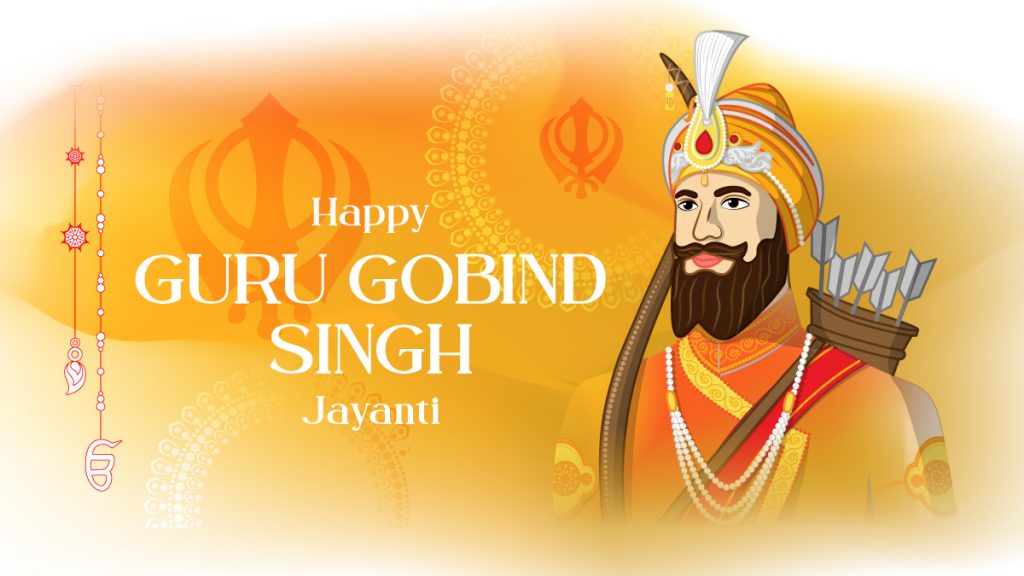Guru Gobind Singh’s Birthday, also known as Guru Gobind Singh Jayanti, celebrates the birth of the tenth and last living Sikh Guru, Guru Gobind Singh Ji. He was born on 22nd December 1666 and is revered for his spiritual teachings and contributions to Sikhism, including the founding of the Khalsa, a collective body of Sikhs dedicated to the defence of religious freedom and justice.
Guru Gobind Singh’s life was marked by courage, sacrifice, and a deep commitment to upholding the principles of Sikhism.
Table of Contents
Guru Gobind Singh’s Birthday Dates for 2024, 2025, and 2026
Here are the dates for Guru Gobind Singh’s Birthday in the upcoming years:
The Significance of Guru Gobind Singh’s Birthday
Guru Gobind Singh Ji was a towering figure in Sikh history, known for his leadership, spiritual wisdom, and martial skills. He played a pivotal role in shaping the identity of the Sikh community, notably by establishing the Khalsa in 1699. The Khalsa stands for purity and righteousness, and its members are dedicated to protecting the weak and upholding justice.
Guru Gobind Singh’s Birthday is a time for Sikhs to honour the life and teachings of their Guru, reflecting on his contributions to Sikhism and his unwavering commitment to the principles of equality, justice, and selfless service.
How Guru Gobind Singh’s Birthday is Celebrated in India
Guru Gobind Singh’s Birthday is celebrated with religious devotion and enthusiasm across India, particularly in Sikh-majority regions like Punjab, Haryana, and Delhi. The celebrations focus on prayer, reflection, and community service.
- Prayers and Kirtan: Devotees gather in gurdwaras (Sikh temples) to offer prayers and participate in kirtan (devotional singing). Hymns and verses from the Guru Granth Sahib, the holy scripture of Sikhism, are recited, with a special focus on the teachings of Guru Gobind Singh.
- Religious Discourses: Gurdwaras also host religious discourses, known as katha, where scholars and religious leaders speak about the life, philosophy, and legacy of Guru Gobind Singh Ji. These discussions highlight the Guru’s teachings on courage, self-sacrifice, and devotion to God.
- Nagar Kirtan (Religious Processions): Nagar Kirtan, a traditional Sikh religious procession, is an integral part of the celebrations. Devotees, led by the Panj Pyare (the five beloved ones), march through the streets while singing hymns and chanting prayers. The Guru Granth Sahib is carried in a palanquin, and the streets are filled with the sound of devotional music.
- Langar (Community Kitchen): One of the core practices during Guru Gobind Singh’s Birthday is the organisation of langar, a free community meal served to everyone, regardless of their background or religion. Langar embodies the Guru’s teachings of equality and selfless service, and volunteers prepare and serve food to thousands of devotees.
Guru Gobind Singh’s Birthday in Different Parts of India
Guru Gobind Singh’s Birthday is celebrated with great devotion in regions with significant Sikh populations. The celebrations may vary slightly depending on local customs, but the essence of honouring the Guru remains central to all observances.
- Punjab: In Punjab, particularly in cities like Amritsar and Anandpur Sahib, the birthplace of the Khalsa, Guru Gobind Singh’s Birthday is celebrated with grandeur. Gurdwaras are illuminated, and large processions and langars are organised. The Golden Temple in Amritsar becomes a focal point of devotion during this time.
- Delhi: In Delhi, major gurdwaras such as Gurdwara Bangla Sahib and Gurdwara Sis Ganj Sahib hold special prayers, kirtan, and langar. Devotees from across the city gather to participate in the religious activities and Nagar Kirtan.
- Haryana: In Haryana, Guru Gobind Singh Jayanti is celebrated with similar enthusiasm, with gurdwaras hosting kirtan sessions, langars, and religious discourses. The day is marked by acts of devotion and charity.
- Maharashtra: In Maharashtra, cities like Mumbai and Pune witness processions and religious gatherings at gurdwaras, where devotees celebrate the Guru’s birth by offering prayers and engaging in community service.
Guru Gobind Singh’s Birthday – A Day of Devotion and Service
Guru Gobind Singh’s Birthday is more than just a celebration of the birth of a great leader; it is a time for Sikhs to reflect on the values of courage, sacrifice, and service that Guru Gobind Singh Ji embodied. His teachings continue to inspire Sikhs to live lives guided by righteousness, equality, and devotion to God.
The celebrations serve as a reminder of the enduring legacy of Guru Gobind Singh and his contributions to Sikhism. Through prayer, service, and acts of charity, Sikhs across India come together to honour their Guru and reaffirm their commitment to the principles he championed.
More Information about Guru Gobind Singh’s Birthday in India
Is Guru Gobind Singh’s Birthday a public holiday in India?
Guru Gobind Singh’s Birthday is a restricted public holiday in many states in India, particularly in regions with significant Sikh populations, such as Punjab, Haryana, and Delhi. Some schools, government offices, and businesses may close to observe the festival.
How is Guru Gobind Singh’s Birthday celebrated in India?
Guru Gobind Singh’s Birthday is celebrated in India with prayers, kirtan (devotional singing), Nagar Kirtan (processions), and langar (community meals). Sikhs gather in gurdwaras to reflect on the Guru’s teachings and engage in acts of service and devotion.
What is the significance of Nagar Kirtan during Guru Gobind Singh’s Birthday celebrations?
Nagar Kirtan is a religious procession that symbolises the unity and devotion of the Sikh community. It involves singing hymns and carrying the Guru Granth Sahib through the streets, spreading the message of the Guru’s teachings.
What role does langar play during Guru Gobind Singh’s Birthday in India?
Langar, the community kitchen, is a central aspect of the celebrations. It reflects Guru Gobind Singh’s teachings of equality and selfless service, as food is prepared and served to everyone, regardless of background or faith, as an act of humility and kindness.

